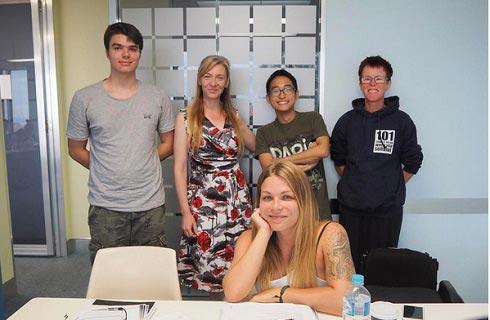- IDP China>
- 课程库>
- 工程与技术>
- 工程>
- 生物医学工程>
- Doctor of Philosophy in Biomedical Engineering - Engineered Biomaterials and Biomechanics
Doctor of Philosophy in Biomedical Engineering - Engineered Biomaterials and Biomechanics

学历文凭
Ph.D.

专业院系
Weldon School of Biomedical Engineering

开学时间

课程时长

课程学费

国际学生入学条件
IDP—雅思考试联合主办方

雅思考试总分
6.5
- 雅思总分:6.5
- 托福网考总分:80
- 托福笔试总分:160
- 其他语言考试:NA
CRICOS代码:
申请截止日期: 请与IDP联系 以获取详细信息。
课程简介
相关申请
 预科
预科 奖学金
奖学金 实习机会
实习机会 在校学习
在校学习 跨境学习
跨境学习 校园授课-线上开始
校园授课-线上开始 在线/远程学习
在线/远程学习
开学时间&学费
学费信息仅供参考,请与IDP联系以获取详细信息
| 开学时间 | 时长 | 学费 | 地点 |
|---|
学校排名

世界排名64
数据源:
泰晤士高等教育世界大学排名
本校相关课程

Doctor of Philosophy in Statistics
学历文凭
Ph.D.
开学日期
课程费用总额


Doctor of Philosophy in Mathematics
学历文凭
Ph.D.
开学日期
课程费用总额


Doctor of Philosophy in Computer Science
学历文凭
Ph.D.
开学日期
课程费用总额


Doctor of Philosophy in Biological Sciences
学历文凭
Ph.D.
开学日期
课程费用总额


Doctor of Philosophy in Management - Organizational Behavior and Human Resource Management
学历文凭
Ph.D.
开学日期
课程费用总额


Doctor of Philosophy in Management - Strategic Management
学历文凭
Ph.D.
开学日期
课程费用总额

其他相关课程

生物医学工程应用科学硕士
 达尔豪斯大学
达尔豪斯大学学历文凭
Masters Degree
开学日期
课程费用总额


生物医学工程技术文凭
 北阿尔伯塔理工学院
北阿尔伯塔理工学院学历文凭
Bachelor Degree
开学日期
课程费用总额


生物医学工程学士学位
 多伦多都会大学
多伦多都会大学学历文凭
Bachelor Degree with Honours
开学日期
课程费用总额


生物医学工程应用科学硕士
 渥太华大学
渥太华大学泰晤士高等教育世界大学排名:188
学历文凭
Masters Degree
开学日期
课程费用总额


工程科学应用科学学士-生物医学工程(荣誉学位)
 西蒙菲莎大学
西蒙菲莎大学学历文凭
Bachelor Degree with Honours
开学日期
课程费用总额


生物医学工程学硕士
 卡尔加里大学
卡尔加里大学学历文凭
Masters Degree
开学日期
课程费用总额










 美国
美国
